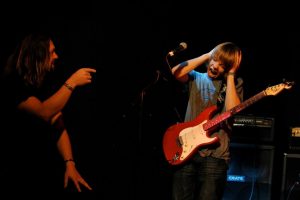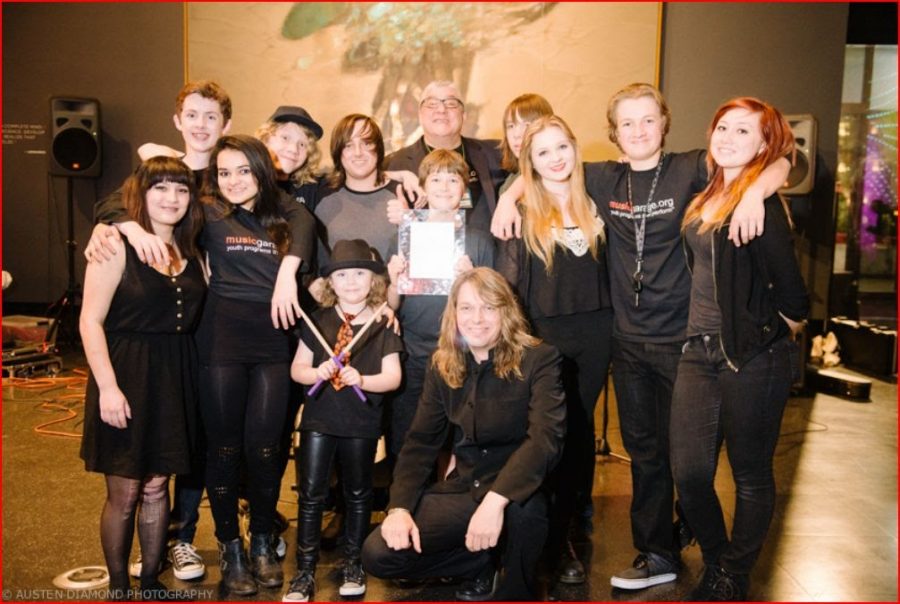Student life is hard. This is one doctrine on which most of us can agree. Over time, education has become not only a measure of a student’s ability to memorize and utilize knowledge, but also a timeframe during which students of all ages — even young children — are meant to expand their resumes, explore extracurricular activities and begin to narrow down their career focuses.
It is therefore essential that students have helpful and proper outlets through which to express themselves, as well as opportunities to learn about their passions and explore the areas of education and training that interest them. After-school programs are being refined all across the country, especially as liberal arts programs are facing cuts in the public education system. Here in Salt Lake, one program in particular has developed in an attempt to benefit the ways students view their lives and futures in the world of music.
MusicGarage.org is a self-described, “after-school program for [kids] ages 11-17 who want to learn how to play in rock, blues and jazz bands. Our expert staff has trained hundreds of Utah’s youth to play in hundreds of venues, festivals and special event shows since 2005.”
As their Sugarhouse space continues to develop, MusicGarage.org has big plans not only for students, but for aspiring musicians as well. They hope to utilize the space to help aspiring musicians learn the pro-tips of recording and editing sound in their recording studios at a much lower cost than many other production companies. Their baseline goal is to merely help these young artists passionately create and produce music. By continually recording their sounds and working to refine them, kids can better themselves as future artists, as well as the community.

When I first encountered this company, my interest was sparked immediately. As I continued to research, I realized how deeply I resonated with the goals behind their mission statement. Having gone through my teenage “transformative,” years designating the majority of my time to studying ballet in a pre-professional setting, I know how essential this art form was to my growth and development not only as an artist, but as a student and adult as well. Being trained in the arts not only forces one to take full responsibility for their passions and career, but also to prioritize, dedicate, sacrifice and experience the rewards that come from hard work. If doing something for fun, like seeing a concert on a Saturday night, is important, a trained artist has the tools to create a time-managed schedule that works. The question of how to fit homework, socializing and the other tasks in that further their artistic nuances gets taken care of because of the artist’s developed intuition, discipline and planning abilities attributable in part to their past dedication to and training in their craft.
As if the time management skills, social experiences and mastering of intrinsic motivation aren’t enough, art somehow continues to reach even farther. Not only do students gain these essential life skills, through artistic endeavors kids become compassionate and empathetic, developing qualities we could all focus on. Art is meant to transcend socioeconomic and racial barriers. Art, in all of its forms, allows youth to acknowledge different life experiences, characters, and learning methods. If you want a student to grow into a well-rounded, empathetic adult, put them in the arts. Contrary to popular belief, the arts are more important than we think. If history has taught us anything, it’s that artistic expressions aren’t going anywhere and will continue to transcend oppression through times of opposition.
By making art affordable, fun and encouraged, MusicGarage.org is just one more example of a group of people working together to help construct kind, well-rounded, talented individuals. An art studio, a dance classroom, or a recording studio becomes a safe space for students to try and fail without consequence – only growth. Unlike a college course, where failing generally entails spending tuition money and lost time in taking the class again, one poor run of a piece of music becomes a learning tool. Failure loses its negative connotation and instead becomes a method of betterment and learning from mistakes. And luckily for us, Salt Lake is taking note and slowly but surely becoming an artistic mecca of the west.
To find out more information about this organization, you can visit their website at www.musicgarage.org.


